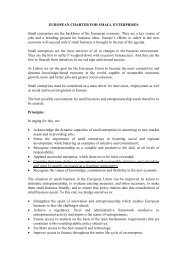Strategies of the Development of Entrepreneurship and SME
Strategies of the Development of Entrepreneurship and SME
Strategies of the Development of Entrepreneurship and SME
You also want an ePaper? Increase the reach of your titles
YUMPU automatically turns print PDFs into web optimized ePapers that Google loves.
<strong>of</strong> <strong>SME</strong>s are not informed at all <strong>of</strong> <strong>the</strong> opportunities presented by <strong>the</strong> Structural Funds, <strong>and</strong>only 1.7 per cent <strong>of</strong> <strong>the</strong> respondents answered “I am fully informed”. 45 per cent <strong>of</strong>respondents are informed to a low extent, <strong>and</strong> hardly 10.6 per cent – to a significant extent.3.2.5. TASKS FOR IMPROVEMENT AND FURTHER DEVELOPMENT OF <strong>SME</strong> SECTORSome <strong>of</strong> <strong>the</strong> weaknesses <strong>of</strong> <strong>the</strong> small <strong>and</strong> medium – sized enterprises are <strong>the</strong> following:• Low labor productivity – twice lower compared to big enterprises• Underused information technology <strong>and</strong> e-commerce• Poor quality <strong>of</strong> marketing strategies• Lack <strong>of</strong> specialization <strong>of</strong> small-scale production; lack <strong>of</strong> unique products• <strong>SME</strong>s are under active in <strong>the</strong> patenting <strong>of</strong> products <strong>and</strong> services• Powers <strong>and</strong> authority concentrated in top managers; underused pr<strong>of</strong>essionalmanagement staff• Insufficient organization <strong>and</strong> collective lobbyingAs we already pointed out, access to financial is a crucial factor for <strong>SME</strong>s start-up,current operations <strong>and</strong> growth. The money <strong>and</strong> <strong>the</strong> capital markets penetration in <strong>the</strong> area <strong>of</strong><strong>SME</strong>s is very low. This is proven by <strong>the</strong> data that almost half <strong>of</strong> <strong>the</strong> Bulgarian <strong>SME</strong>s have neverapplied so far for a loan (45 per cent <strong>of</strong> <strong>SME</strong>s). This may be caused ei<strong>the</strong>r by <strong>SME</strong>s owners’fears related to inadequate financial training, or by considerations <strong>of</strong> avoiding financial risk, inparticular with sole proprietors. This results in higher level <strong>of</strong> security, but also in lower returnon equity. It is indicative <strong>of</strong> <strong>SME</strong>s probability <strong>of</strong> success when applying for a loan is that hardly13 per cent <strong>of</strong> submitted projects are approved. According to ESTAT Agency surveys <strong>the</strong> majorreasons for <strong>the</strong> high number <strong>of</strong> rejections are: inadequate collateral, poor financial condition,lack <strong>of</strong> clarity in <strong>the</strong> project. Bank lending remains a costly <strong>and</strong> hardly accessible source formost <strong>of</strong> Bulgarian <strong>SME</strong>s. Also, <strong>the</strong>re is poor awareness <strong>of</strong> <strong>the</strong> opportunities provided byEuropean funds among <strong>SME</strong>s <strong>and</strong> lack <strong>of</strong> capacity to develop projects <strong>and</strong> draw money from EUfunds. Therefore, it is important to extend <strong>the</strong> rank <strong>of</strong> <strong>the</strong> alternative financial sources.Bulgarian <strong>SME</strong>s are still passive in penetrating <strong>the</strong> international market <strong>and</strong> dealing withcompetitive pressure. The reasons for this could be sought in <strong>the</strong>ir insufficient experience(many companies are comparatively new <strong>and</strong> are trying to establish <strong>the</strong>mselves on <strong>the</strong> internalmarket first as establishment on international markets takes time), as well as <strong>the</strong>ir productionorientation (most companies, especially small <strong>and</strong> micro-enterprises, are engaged in trade,services <strong>and</strong> construction, which are internal market oriented), <strong>and</strong> also in low competitivenessbecause <strong>of</strong> labor, material <strong>and</strong> energy intensive production <strong>and</strong> low technological level.The business community's general opinion is that <strong>the</strong> level <strong>of</strong> knowledge <strong>and</strong> skillsacquired by students throughout <strong>the</strong> system <strong>of</strong> education, including secondary vocationalschools, fails to meet <strong>the</strong>ir needs. It is both necessary to introduce more business-relateddisciplines in school curricula <strong>and</strong> use modern forms <strong>and</strong> methods <strong>of</strong> teaching <strong>and</strong> to ensure<strong>the</strong> active partnership between businesses <strong>and</strong> educational institutions in order to improve <strong>the</strong>quality <strong>of</strong> entrepreneurial education <strong>and</strong> training <strong>and</strong> create incentives for business start-up.Setting up <strong>and</strong> implementing a policy <strong>of</strong> targeted <strong>and</strong> efficient training in entrepreneurial skillsin Bulgaria represents a complex process which requires, among o<strong>the</strong>r things, pooling toge<strong>the</strong>r<strong>the</strong> efforts <strong>of</strong> all interested players: <strong>the</strong> state, educational institutions, <strong>the</strong> business world <strong>and</strong>students <strong>the</strong>mselves. The clear distribution <strong>of</strong> responsibilities for each <strong>of</strong> <strong>the</strong>se groups <strong>of</strong>stakeholders, <strong>and</strong> <strong>the</strong> establishment <strong>of</strong> an effective system to ensure <strong>the</strong>ir motivatedinvolvement are necessary <strong>and</strong> important prerequisites for a successful policy.There is a need to enhance <strong>the</strong> public-private partnership in providing information <strong>and</strong>consulting services to <strong>the</strong> small <strong>and</strong> medium-sized business. Organizations in support <strong>of</strong>business are not very popular <strong>and</strong> trustworthy among <strong>the</strong>ir members <strong>and</strong> beneficiaries; <strong>the</strong>39
















